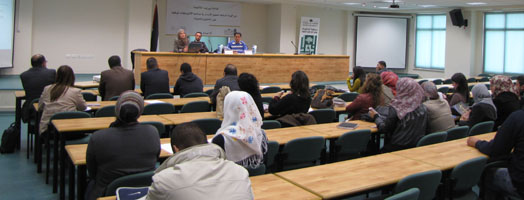The Role of ICHR in addressing Human Rights Issues
On behalf of the Independent Commission of Human Rights (ICHR), Advocate Fadwa Thuweib made the presentation.
Having welcomed the audience, Advocate Mu’in al Barghouthi, Legal Researcher at the IoL, stressed the significant debate on human rights and freedoms in Palestine. Advocate Al Barghouthi explained that the legal encounter “is in consistence with our solidarity with brave Palestinian political prisoners, especially those on hunger strike. Palestinian prisoners have demonstrated an unparalleled championship in defending their right to life, freedom and dignity.”
As a national institution, Advocate Thuweib explained that the ICHR monitors the status of human rights and documents human rights violations. The relevant Presidential Decree and ICHR Bylaw provide for major powers and tasks carried out by the ICHR. ICHR executive offices implement ICHR functions throughout the West Bank and Gaza Strip. According to its vision and mission, the ICHR follows up on and ensures safeguards of human rights in various Palestinian regulations and throughout Palestinian official bodies. The ICHR receives public complaints about practices of maladministration, abuse of power and wasting of public funds. The ICHR also raises public legal awareness and promotes public control and monitoring of human rights. Advocate Thuweib highlighted importance of the ICHR’s monthly and annual reports, which shed light on the status of human rights across the Palestinian territory. Major human rights violations monitored by the ICHR in 2011-12 included encroachments on the right to peaceful assembly, battering and torture.
In the ensuing discussion, the audience raised significant questions and made interventions on the status of human rights and relevant violations in the Palestinian context. Discussants addressed the ICHR’s role in monitoring Israeli violations as well as effective accountability mechanisms in processing complaints. Participants also highlighted infringements on the sanctity of homes, psychological impact of human rights violations on children, and physical assaults during peaceful assemblies.
The legal encounter brought together a significant number of law students at Birzeit University, academic researchers, legal experts and representatives of civil society actors.
The legal encounter was held with support from the Konrad Adenauer Stiftung.











